Call us
+919650935061Address
Nirman Nagar, JaipurGoogle Rating
5.0( 607+ Reviews )

Overview
What are Teeth Scaling & Polishing?

Overview
What are Teeth Scaling & Polishing?
Teeth scaling and polishing are routine dental procedures that enhance oral health through the removal of plaque, tartar, and stains. Scaling removes hardened plaque from teeth and gumline and prevents gum disease. Simultaneously, teeth are surface cleaned using a rotary brush and a mildly abrasive paste to remove surface stains and make plaque harder to stick to.
Teeth scaling and polishing in Jaipur enhance dental health, eliminate bad breath, and enhance the looks of teeth. Scaling and polishing need to be done every six months to achieve good dental health and a bright smile. If you are looking for the best Dental clinic for teeth scaling and polishing near me in Jaipur, Dr Renu Dental Clinic is the right place for you.
Signs That you Need
What are the Signs That you Need Teeth Scaling and Polishing?
Regular polishing and scaling of teeth maintain dental health in order, but some signs inform you when it is time. If you notice any of the following, it is time to have your teeth cleaned. They are as follows
Chronic Bad Breath
Plaque harbours bacteria that produce smelly breath. If bad breath persists even after brushing, scaling can eliminate bacterial deposits. It removes hidden bacteria in gum pockets, leading to fresher breath.
Yellowed or Discoloured Teeth
Coffee, tea, smoking, and poor oral hygiene can all lead to tooth discolouration. Polishing removes surface stains and whitens teeth. Regular polishing also prevents stubborn stains from penetrating deeper into the enamel.
Bleeding Gums
Bleeding gums when brushing or flossing show plaque buildup and the development of gum disease. Scaling removes microorganisms and prevents future complications. Healthy gums should not bleed easily, so any repeated bleeding needs attention.

Visible Tartar Deposits
Hardened plaque (tartar) manifests as yellow or brown deposits along the gumline. Scaling is the only way to remove them. Ignoring tartar buildup raises the risk of cavities and gum diseases.
Tooth Sensitivity
Excessive plaque leads to gum recession, exposing sensitive areas of teeth. Scaling reduces further exposure and pain and reduces tooth sensitivity. This also reduces sensitivity while building enamel.
Loose teeth
Advanced gum disease due to tartar buildup destroys tooth structure. Scaling prevents tooth loss by removing harmful bacteria. Early treatment may save your natural teeth from permanent damage.

Chronic Bad Breath
Plaque harbours bacteria that produce smelly breath. If bad breath persists even after brushing, scaling can eliminate bacterial deposits. It removes hidden bacteria in gum pockets, leading to fresher breath.
Yellowed or Discoloured Teeth
Coffee, tea, smoking, and poor oral hygiene can all lead to tooth discolouration. Polishing removes surface stains and whitens teeth. Regular polishing also prevents stubborn stains from penetrating deeper into the enamel.
Bleeding Gums
Bleeding gums when brushing or flossing show plaque buildup and the development of gum disease. Scaling removes microorganisms and prevents future complications. Healthy gums should not bleed easily, so any repeated bleeding needs attention.
Visible Tartar Deposits
Hardened plaque (tartar) manifests as yellow or brown deposits along the gumline. Scaling is the only way to remove them. Ignoring tartar buildup raises the risk of cavities and gum diseases.
Tooth Sensitivity
Excessive plaque leads to gum recession, exposing sensitive areas of teeth. Scaling reduces further exposure and pain and reduces tooth sensitivity. This also reduces sensitivity while building enamel.
Loose teeth
Advanced gum disease due to tartar buildup destroys tooth structure. Scaling prevents tooth loss by removing harmful bacteria. Early treatment may save your natural teeth from permanent damage.
Health Tips
Your Guide to a Healthier Smile
Our health tips video is given below which gives you a guide and practical advice to maintain a healthy smile. Learn expert tips from Dr. Renu on oral hygiene, preventive care, and nutrition to keep your teeth strong and bright every day.

15+ Years of Experience

Meet Your Doctor
Dr. Renu Chaudhury
BDS, MDS & PGCOI(PGI)
Dr. Renu Chaudhary is a well-known dentist with 15+ years of experience in teeth stain removal in Jaipur. With her advanced knowledge of dental care, she has changed the smiles of thousands of people. Her accuracy, care, and use of up-to-date methods make sure that every patient has a smooth and pleasant experience.
As one of the best teeth scaling and polishing dental clinics in Jaipur, Dr Chaudhury focuses on restoring people’s confidence through implants that look and last like real teeth. She offers minimally invasive treatments at her clinic. She prioritises her patients’ needs and is dedicated to providing high-quality care, making her the best choice for patients who want reliable and long-lasting dental repair.
20K+
Dental Procedures
10K+
Smile Makeovers
20K+
Happy Patients
Why Choose
Why Choose Dr. Renu Dental Clinic for Teeth Scaling & Polishing?
Dr. Renu Chaudhary is renowned for teeth scaling and polishing in Jaipur. Below are more reasons why you should choose Dr.Renu Dental Clinic for dental cleaning in Jaipur.
Years of Experience
Dr. Renu Chaudhary has over 15 years of expertise in general and cosmetic dentistry and oversees a team of highly qualified specialists. Our clinic is well-known for its expertise in preventive dental care, ensuring that patients receive the best possible treatment. Our expertise ensures you get perfect teeth scaling and polishing in Jaipur, resulting in great oral hygiene.
State-of-Art Clinic
Our dental hospital in Jaipur offers teeth scaling and polishing services. It is equipped with advanced ultrasonic scalers and superior-quality dental instruments to provide the best possible treatment. Advanced technology eliminates pain during rigorous cleaning. This precision-based method enables the complete removal of plaque and tartar, making the process painless, quick, and extremely successful for long-term oral health.
Personalised Patient Care
Every patient has different dental needs, and Dr. Renu Dental Clinic values individual care. Dr. Renu evaluates each patient's dental condition before giving the optimum treatment. At our clinic, patient comfort is our utmost concern, and our stress-free ambience makes us a reliable source of professional tooth-cleaning services.
Years of Experience
Dr. Renu Chaudhary has over 15 years of expertise in general and cosmetic dentistry and oversees a team of highly qualified specialists. Our clinic is well-known for its expertise in preventive dental care, ensuring that patients receive the best possible treatment. Our expertise ensures you get perfect teeth scaling and polishing in Jaipur, resulting in great oral hygiene.
State-of-Art Clinic
Our dental hospital in Jaipur offers teeth scaling and polishing services. It is equipped with advanced ultrasonic scalers and superior-quality dental instruments to provide the best possible treatment. Advanced technology eliminates pain during rigorous cleaning. This precision-based method enables the complete removal of plaque and tartar, making the process painless, quick, and extremely successful for long-term oral health.
Personalised Patient Care
Every patient has different dental needs, and Dr. Renu Dental Clinic values individual care. Dr. Renu evaluates each patient's dental condition before giving the optimum treatment. At our clinic, patient comfort is our utmost concern, and our stress-free ambience makes us a reliable source of professional tooth-cleaning services.
Types of Teeth Polishing
Polishing of teeth is an important dental treatment that removes stains and plaque from teeth to improve oral health and looks. Different methods of cleaning are used for different reasons, from mild reasons like removing stains to more advanced treatments for severe discolouration. These are the main ways of professional teeth polishing in Jaipur:
1. Therapeutic Polishing
Therapeutic polishing smooths out the root surfaces of teeth, especially after scaling and root cutting. It removes germs and poisons in the root area, which prevents gum disease from worsening. People with gum problems need this kind of cleaning to help their gums heal and lower their chances of developing an infection.
Advantages
- Helps gums heal faster after a deep clean
- It helps prevent gum disease from getting worse
- Reduces germs from building up and inflammation of the gums
Disadvantage
- Not for people with healthy gums
- It can make you feel a bit uncomfortable or sore
2. Cosmetic Polishing
Cosmetic polishing can improve the appearance of teeth by removing surface spots and leaving them shiny and smooth. A slightly rough paste is rubbed on using a rotating brush or rubber cup, and the teeth look better. This kind of whitening is often used after teeth cleaning.
Advantages
- It makes your teeth look better and brighter.
- It removes stains caused by smoking, drinking, and food.
- Smoothens the teeth’s surface, which helps prevent gunk from building up.
Disadvantage
- Spots can come back if you do not take proper care of your teeth.
- Not for big spots or natural discolouration
3. Superficial Polishing
Superficial polishing is a fast and painless method of removing spots on the surface of teeth. A dentist typically performs it at the end of a cleaning to leave the teeth smooth and shiny. It doesn’t touch the inner layers of enamel or help heal.
Advantages
- It’s fast and easy to whiten teeth.
- Removes light surface spots and plaque.
- Leaves teeth smooth and clean.
Disadvantage
- It doesn’t remove stubborn spots or damage
- Not best for your mouth health in the long run
4. Selective Polishing
Selective cleaning is a method that only buffs out stained teeth and not all of them. It leaves healthy enamel free from being worn away unnecessarily while targeting spots that are obviously stained. Dentists use this method to help preserve the structure of the enamel as well as leave stained teeth more attractive.
Advantages
- Helps keep enamel healthy and strong
- Removes stubborn spots from targeted areas effectively
- Compared to full-mouth cleaning, it removes unnecessary enamel loss.
Disadvantages
- Requires regular professional evaluation, which might be expensive.
- Can leave teeth raw in some areas, which would make the shine slightly uneven.
How Does Tooth Scaling and Polishing Work?
Tooth scaling and polishing remove stains, which automatically improves oral hygiene. Here is a brief overview of how tooth scaling and polishing works:
- Scaling is done to remove plaque from teeth and beneath the gumline. It involves a deep cleaning process to remove any tartar or bacteria from the root and is also used for root planing.
- After scaling, polishing involves smoothing the teeth’ surface with a rotating rubber cup and a slightly abrasive paste. It removes stains caused by food, drinks, and smoking, making teeth cleaner and whiter. Polishing also minimises the chances of future plaque buildup.
- Dentists at teeth scaling and polishing dental hospitals in Jaipur utilise ultrasonic scalers, which possess high-frequency vibration, to remove tartar efficiently. They also use hand scalers for precision, especially in areas where there is excessive plaque deposit.
- The whole process is painless. However, some people may experience some sensitivity. Dentists advise scaling and polishing teeth every six months to maintain good dental health. These services prevent gum disease, provide fresh breath, and improve overall oral cleanliness.
What is the Procedure for Getting Teeth Scaling & Polishing?
Teeth Scaling & Polishing Treatment in Jaipur are a systematic procedure for eliminating plaque and stains and maintaining healthy teeth. Though painless, there can be some mild sensitivity afterwards. Scaling and polishing prevent dental issues and improve oral hygiene. The procedure is short, typically 30 to 45 minutes. The steps of the procedure are as follows:
1. First Inspection
The dentist examines the teeth and gums for plaque and tartar deposits. If a deep cleaning is needed, X-rays may be taken.
2. The Process of Scaling
With hand scalers or ultrasonic scalers, the dentist removes hardened plaque from the surface of the teeth and from behind the gum line. The water spray and vibrations loosen recalcitrant tartar deposits.
3. Root Planning
Root planing is performed for patients with large gum pockets. Smoothing the root surfaces encourages gum reattachment and prevents bacterial growth.
4. Polishing
In a rotating rubber cup, the teeth are treated with a mildly abrasive paste. During the process, surface stains are eliminated, and teeth are left smooth and shiny.
5. Optional Fluoride Treatment and Rinsing
To remove any remaining fragments of waste, the mouth is rinsed. Some dentists apply fluoride to make enamel stronger and minimise sensitivity.
Transform Your Smile with Expert Dental Care!
Let’s Request a Schedule For Consultation
Book AppointmentWhat Should I Know Before Getting my Teeth Scaled and Polished?
Before your teeth are polished and scaled, you should understand what to anticipate. Here are important things to remember:
1. Scaling Removes Tartar and not Enamel
Some people believe that scaling damages enamel, but it simply eliminates hardened plaque. The enamel remains intact, enhancing oral health without destroying tooth structure.
2. Chances of Mild Sensitivity
Tooth sensitivity is typically experienced temporarily after scaling. The sensitivity normally disappears after a few days when the gums heal.
3. Elements Gum Disease
Scaling eliminates the germs that cause gum disease, halting it and strengthening teeth. It also prevents severe conditions such as periodontitis and tooth loss.
4. Polishing Does not Whiten Teeth
Polishing eliminates surface stains but does not provide whitening. Deep stains require professional whitening treatments. It can be done in conjunction with polishing.
5. Bleeding During the Process is Normal
If your gums are inflamed, some bleeding during scaling is normal, but it vanishes after the gums heal. This is a sign of underlying gum issues that will improve with therapy.
6. Post-Treatment Care is Essential
For a few hours after treatment, avoid eating acidic foods or beverages to prevent pain and sensitivity. Adequate aftercare ensures long-term benefits and comfort.
What are the Benefits of Teeth Scaling & Polishing?
Teeth Scaling & Polishing Treatment in Jaipur can help you maintain good oral hygiene and prevent dental problems. They eliminate plaque and tartar, leading to a healthy smile and fresh breath. Regular sessions enhance oral and general health. Its benefits are as follows:
1. Prevents Diseases
Scaling prevents gum disease by eliminating plaque and tartar buildup, which can lead to gum infections. It also prevents gingivitis and periodontitis, which can lead to healthy gums. Regular cleaning minimises inflammation and bleeding.
2. Eliminates Bad Breath
Bacteria and plaque lead to chronic bad breath and a foul mouth sensation. Scaling eliminates odour-causing bacteria, leading to fresher breath. It improves your oral dental hygiene and confidence.
3. Reduces the Risk of Cavities
Plaque and tartar weaken enamel, leading to weakening and cavities. Scaling eliminates bacteria buildup and safeguards teeth. Tooth scaling and polishing ensures long-term tooth strength and health through root planing.
4. Restores a Bright Smile
Polishing whitens the teeth and eliminates coffee, tea, and smoking stains. It restores natural whiteness to the teeth, giving your smile a brighter look. This cosmetic advantage enhances confidence when socialising.
5. Enhances Overall Health
Poor oral hygiene has been associated with cardiovascular disease and diabetes. Eliminating microorganisms from the mouth minimises the risk of infection, resulting in better overall health and well-being.
6. Prevents Tooth Loss
Tartar, bacteria or plaque can cause serious gum diseases. Gum diseases can weaken the teeth, leading to tooth loss. Scaling keeps the gums firm and prevents bacterial growth, keeping teeth strong and intact.
7. Enhances Oral Hygiene
Teeth cleaning eliminates particles that brushing alone cannot. Routine cleaning and polishing will ensure that there is no bacteria buildup, thereby preventing any infection. This also improves your dental care.
8. Boosts Confidence
A clean, fresh smile gives you confidence. It facilitates professional and social interactions. Healthy teeth make you look better, and you become more appealing. Good dental hygiene will also prevent bad breath and yellow stains on the teeth.
How to Take Care of Your Teeth After Teeth Scaling & Polishing?
After teeth scaling and polishing in Jaipur, normal care is necessary to ensure healthy teeth. Proper hygiene practices prevent plaque formation and gum disease. Follow these simple steps to get long-lasting effects.
1. Brush Gently Twice a Day
Brush teeth gently with a soft-bristled toothbrush and fluoride toothpaste to keep gums healthy. Do not brush hard since it wears away enamel and causes sensitivity in the long term. Soft, circular motions enable thorough cleaning while maintaining oral health.
2. Floss Everyday
Floss daily to remove food and plaque from between teeth, where a toothbrush can’t reach. This keeps gum disease, cavities, and bacteria from growing, all of which cause bad breath. Adding flossing to your daily routine is healthy for your gums and your oral health.
3. Drink plenty of water
Consuming large amounts of water washes food particles and bacteria out of the mouth, reducing the risk of cavities and gum disease. Drinking water also stimulates saliva, which cleanses the mouth naturally and protects dental enamel.
4. Eat a Healthy Diet
Consume foods that are rich in calcium, such as dairy, leafy vegetables, and nuts, to strengthen your teeth and bones. Limit acidic and sweet foods, which erode enamel and cause tooth decay. Proper nutrition promotes oral health, as well as general health.
5. Visit Your Dentist Every six Months
To maintain healthy gums and teeth, you should schedule regular dental checkups and professional cleanings at least twice a year. Dentists can detect early signs of cavities, gum disease, and other problems in the mouth before they become worse.
6. Stop Smoking and Drinking Alcohol
Smoking discolours teeth, boosts the prevalence of gum disease, and inhibits healing after dental treatment. Excessive alcohol dries out the mouth, resulting in bacterial proliferation and increased susceptibility to tooth decay. These two habits contribute towards healthier gums, cleaner breath, and better oral health when one abstains.
How Long Does Tooth Scaling and Polishing Last?
Teeth scaling and polishing in Jaipur can last from six months to a year. Several factors impact the duration, such as your oral hygiene. Here are some of the fa factors that can impact the duration:
1. Plaque and Tartar Buildup
Plaque accumulates naturally over time, turning into tartar gradually if not cleaned. Individuals who have poor oral hygiene may need scaling from every three to six months, while others can have it once a year.
2. Diet and Lifestyle Factors
Eating stain-causing foods such as coffee, tea, red wine, and smoking erodes the effects. Such a diet often creates yellow stains on teeth, which can make them look unhygienic and lower one’s confidence in public. Not consuming them keeps teeth cleaner for longer.
3. Gum Health Condition
When you have gum disease or are susceptible to the development of tartar, more regular scaling is necessary. Regular dental checkups assist in assessing gum health and the optimum schedule.
4. Oral Hygiene Routine
Brushing teeth twice daily, flossing, and using mouthwash enhances the effect of scaling and polishing. Proper hygiene reduces plaque buildup and inflammation of gums. Oral hygiene is very important to prevent any infection or serious disease.
Dos and Don’ts of Teeth Scaling & Polishing
Taking care of yourself during scaling and polishing is important. Here are the common dos and Don’ts after dental cleaning in Jaipur.
| Do’s | Don’ts |
|---|---|
| Have a healthy and nutritious diet | Smoking and Drinking |
| Brush and floss regularly | Eating acidic and sugary food |
| Use mouthwash regularly | Consuming coffee, tea, red wine, and dark sodas |
| Stay hydrated | Let plaque build-up |
| Get prescribed medications | Use harsh toothpastes or mouthwashes |
| Visit your dentist regularly for checkups | Having very hot soups, iced drinks, or very cold foods may trigger sensitivity |
What are the Limitations of Tooth Scaling and Polishing?
Teeth scaling and polishing are useful for dental hygiene but have certain limitations. Some of them are:
1. Not Permanent Whitening Teeth
Scaling and polishing teeth simply remove plaque and tartar from the surface. They cannot treat cavities, root infections, or other dental issues that require specialised treatments, such as fillings or root canals. Without addressing these issues, dental problems can degrade with time.
2. A Short-Term Solution to Gum Disease
Scaling and polishing help manage gum disease by eliminating plaque, but they do not provide a long-term solution. Regular oral hygiene and further treatment may be necessary to maintain the condition. Without subsequent care, the condition could recur and progress.
3. Can Produce Temporary Tooth Sensitivity
Temporary dental sensitivity is experienced by some patients following scaling, especially those with thin enamel or gum recession. The sensitivity usually disappears after a few days but can be annoying. In case of prolonged sensitivity, additional treatments may be required.
4. Does not Prevent Cavities
Scaling and polishing merely eliminate plaque accumulation. They do not affect cavities, which are caused by the weakening of enamel. Brushing and flossing continue to be essential for cavity protection as they make enamel stronger straight away and decrease germs.
5. Limited Effect on Cosmetic Issues
Tooth scaling and polishing can get rid of tartar and stains on teeth to make them appear better. They cannot, though, change the colour of teeth or fix cosmetic problems like fractures or crooked teeth. More obvious cosmetic changes may need treatment, like teeth whitening or veneers.
6. Not for Everyone
Scaling and polishing can be unsuitable for individuals with heart disease or extensive gum recession. It is important to visit a dentist to determine whether the procedure is safe based on individual health issues. In certain situations, alternative treatments can be recommended.
Cost of Getting Teeth Scaling & Polishing in Jaipur
Dental Implant treatments vary in the procedures and payments. The process can vary depending upon the condition of the patient’s teeth and can range from ₹1500 to ₹5000. Here are the key factors related to dental scaling and polishing in Jaipur:
1. Treatments
Dental scaling and polishing costs may vary depending on the condition of the patient’s teeth. Too much plaque or tartar buildup can be more expensive. Since more buildup requires more extensive treatment, the prices may be slightly higher than for a normal cleaning process.
2. Location
The location of the clinic determines the prices of the services offered. Prices are lower in rural areas than in metropolitan cities, which have more efficient healthcare facilities and experts. Thus, prices depend greatly on the location of the clinic.
3. Experience of the Dentist
The cost of dental scaling and polishing depends on the doctor’s expertise and experience. The more experience a dentist has, the more pricey the treatment gets. If you are looking to scale and polish at an affordable rate, we are there to assist you.
4. Dental Insurance
Discounts are available at some clinics if you have dental insurance. Insurance can lower the total price, making the treatment more within reach. Be sure to ask the clinic for coverage information to confirm the procedure is covered under your plan.
Myth & Fact
Common Myths About Tooth Scaling and Polishing
Numerous myths surround tooth scaling and polishing, which generate unnecessary fear and discourage individuals from undergoing the required dental treatment. Below are some common myths busted.
Myth:Scaling And Polishing Damages Teeth
Fact:Scaling is usually believed to soften teeth, but it actually simply removes plaque and tartar. It does not break down enamel and ensures strong and healthy teeth. Cleanings regularly preserve enamel from damage and ensure the overall health of the teeth.
Myth:The Procedure Causes Pain
Fact:Scaling and polishing of teeth are generally pain-free. Dentists employ non-painful methods so temporary discomfort can be experienced. Sensitive patients can be treated with local anaesthesia for a painless experience, as it is appropriate for anxious patients about dental check-ups.
Myth:Scaling Creates Gaps In Teeth
Fact:Spaces are more evident after tartar removal, but they existed beforehand. Scaling shows the natural tooth morphology without adding extra spaces. Gradually, it enhances overall dental appearance by making teeth appear cleaner and more uniform.
Myth:It is Solely for Gum Disease Patients
Fact:Even if you are a healthy individual, you need to scale and polish. It prevents plaque from developing, which decreases the chances of cavities, gum disease, and bad breath. Prevent it early so you can maintain healthy teeth for many years, a fresh breath, and a clean smile.
Myth:Sensitivity After Scaling
Fact:Sensitivity results from the removal of tartar, exposing enamel. It is merely temporary and will recover with desensitising toothpaste or fluoride treatments. Tartar formation and gum recession may be prevented by regular cleanings, reducing the risk of subsequent sensitivity problems.
Myth:Ongoing Scaling Weakened Teeth
Fact:Regular professional cleaning keeps dental health in check. It does not harm teeth but prevents decay, ensuring long-term dental health and healthy gums. Regular cleanings can also help to prevent gum irritation and infection, enhancing overall dental health.
Testimonial (Google Reviews)
Patient Feedback on Google
Here is what our happy patients say on Google about Dr. Renu Dental & Multi Speciality services their visit experience and the results of offered treatments.
Vipin Khandelwal
I had an excellent experience at Dr. Renu Dental Clinic. The staff is incredibly friendly and professional, creating a welcoming and comfortable environment. Dr. Renu's expertise and gentle approach made the treatment smooth and pain-free. They take the time to explain procedures and answer questions, which is truly reassuring. Highly recommend this clinic for anyone seeking quality dental care!
Anshul Kayath
It was really a good experience at Dr. Renu's dental clinic. She treated our daughter's tooth cavity and pulpotomy done by her was painless. Best dental clinic in the area.
V.K h.k
I visited Dr. Renu Dental Clinic for a teeth whitening and smile makeover and couldn’t be happier with the results. Dr. Renu is the best cosmetic dentist in Jaipur, and her attention to detail is impeccable. My teeth are now brighter, and my smile looks better than ever. I highly recommend Dr. Renu for cosmetic dentistry services.
Jyoti
I recently had a root canal procedure and capping of the tooth done at Dr Renu's dental clinic, and I couldn’t be more pleased with the experience. Dr. Renu and her entire staff were exceptional. From the moment I walked in, I was greeted with warmth and professionalism. The procedure was explained thoroughly, and Dr. Renu ensured I was comfortable throughout. The entire team demonstrated great expertise and care, making a potentially stressful experience quite pleasant. The follow-up care has been impeccable, and I’m delighted with the results. I highly recommend Dr.Renu and her team for anyone seeking top-notch dental care."
FAQs
Everything You Need to Know
At our clinic, patient satisfaction and trust are our top priorities. Dr. Renu Chaudhary.
The procedure is generally not painful. However, some individuals may experience mild discomfort or sensitivity, especially if they have sensitive gums or significant tartar buildup. Dentists can use local anaesthesia to minimise discomfort.
Scaling and poIt is generally recommended to visit a teeth scaling and polishing specialist in Jaipur every 6 to 12 months for a professional cleaning. However, the frequency may vary depending on your oral hygiene, lifestyle, and dental condition. Consult the best dentist for teeth cleaning in Jaipur at our clinic to determine the ideal schedule for you.lishing should be done every 6 to 12 months, depending on the condition of your teeth and gums. If you are likely to develop gum disease or have heavy tartar buildup, more regular cleaning will be needed.
Scaling and polishing remove plaque and surface stains to give teeth a cleaner appearance. But they do not change the natural tooth colour. Deep discolouration needs professional whitening.
No, professionally performed scaling is not bad for enamel. It removes plaque and tartar deposits responsible for causing cavities and gum disease, improving oral hygiene.
Most individuals have little or no recovery time. Mild soreness or gum sensitivity can be felt for a couple of days, but with good oral hygiene it decreases pain.
Yes, but use a soft-bristled toothbrush and soft strokes so as not to stimulate sensitive gums. Avoid rough brushing for the first 24 hours to avoid pain.
Yes, as plaque becomes tartar, which cannot be cleaned by brushing, scaling is performed to clean deep down, avoid gum disease and ensure oral hygiene.
Teeth scaling and polishing are professional dental cleaning procedures that help remove plaque, tartar, and surface stains from your teeth. If left untreated, plaque buildup can lead to gum diseases and bad breath. At Dr. Renu Dental Clinic, a leading teeth scaling and polishing dental clinic in Jaipur, we use advanced techniques to ensure a painless and effective cleaning experience.
The affordable teeth cleaning cost in Jaipur depends on factors such as the level of plaque buildup, dental clinic standards, and additional treatments required. At Dr. Renu Dental Clinic, we offer high-quality and budget-friendly dental cleaning services. Contact us for an exact cost estimate based on your dental needs.
Yes! Teeth stain removal in Jaipur is a key benefit of professional dental cleaning in Jaipur. Our advanced scaling and polishing techniques effectively remove surface stains caused by coffee, tea, smoking, or poor oral hygiene, giving you a brighter and healthier smile.
The procedure is generally painless, though some patients might experience mild sensitivity, which subsides quickly. Our experts ensure a comfortable experience at the best clinic for teeth scaling and polishing near me in Jaipur, using modern techniques to minimize discomfort.
If you are searching for teeth scaling and polishing near me in Jaipur, Dr. Renu Dental Clinic is your go-to destination. With experienced professionals and advanced technology, we provide top-quality professional teeth polishing in Jaipur to maintain your oral health.


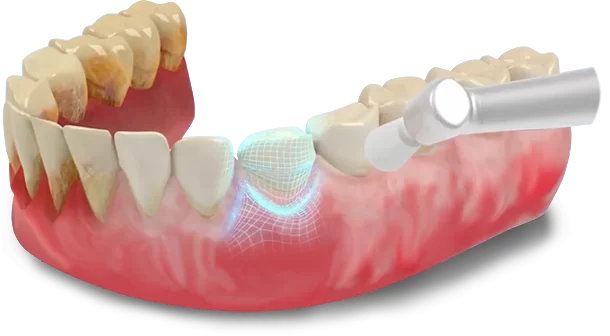
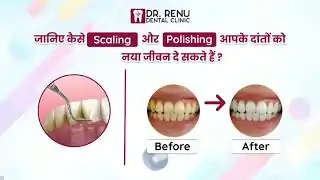
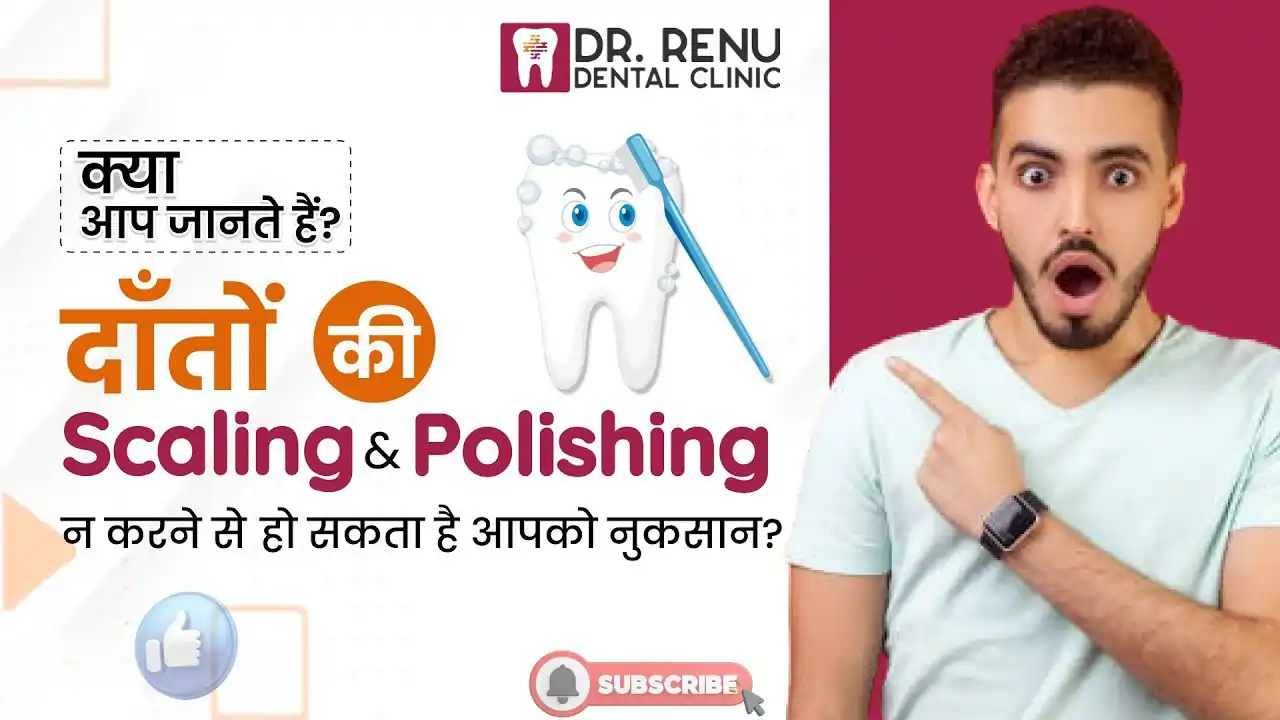


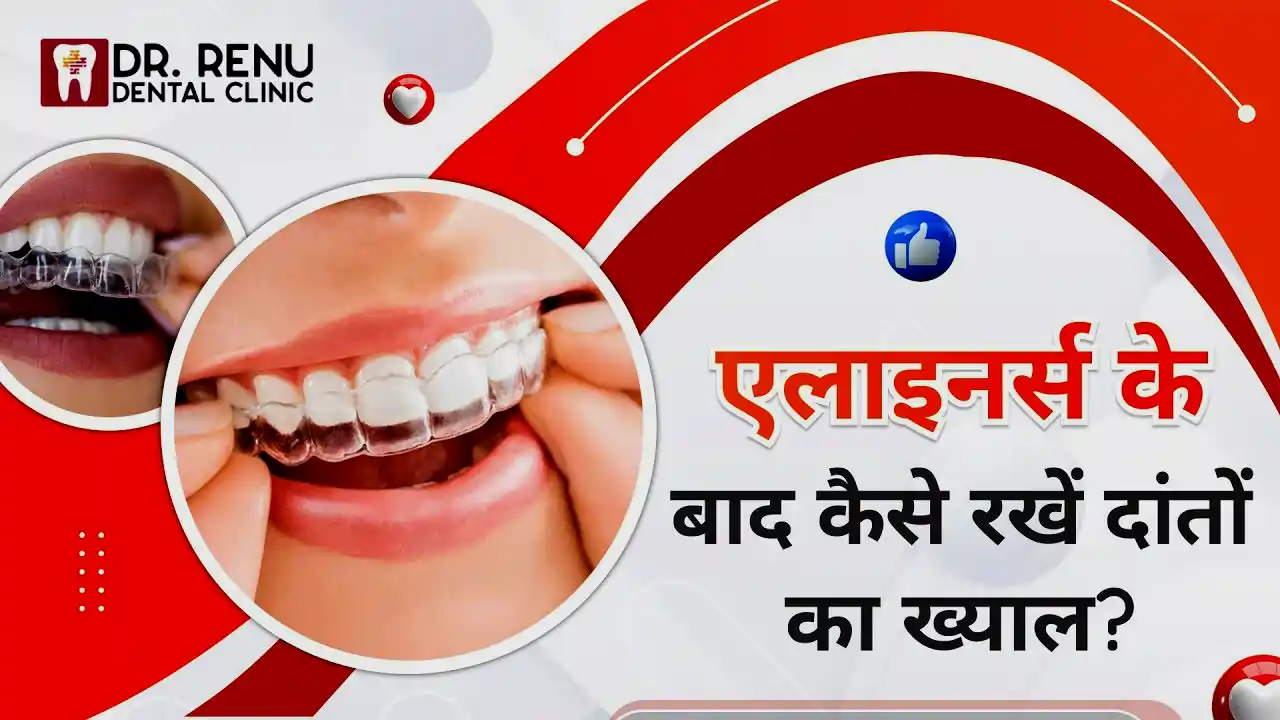



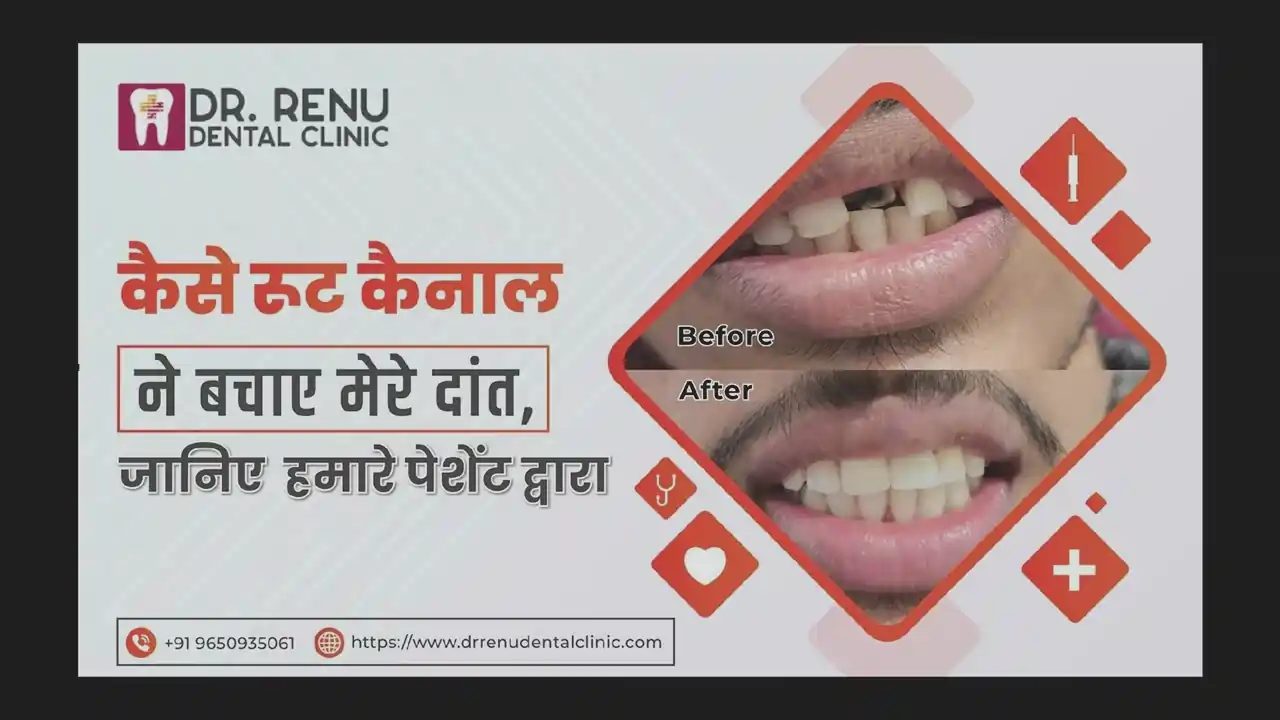


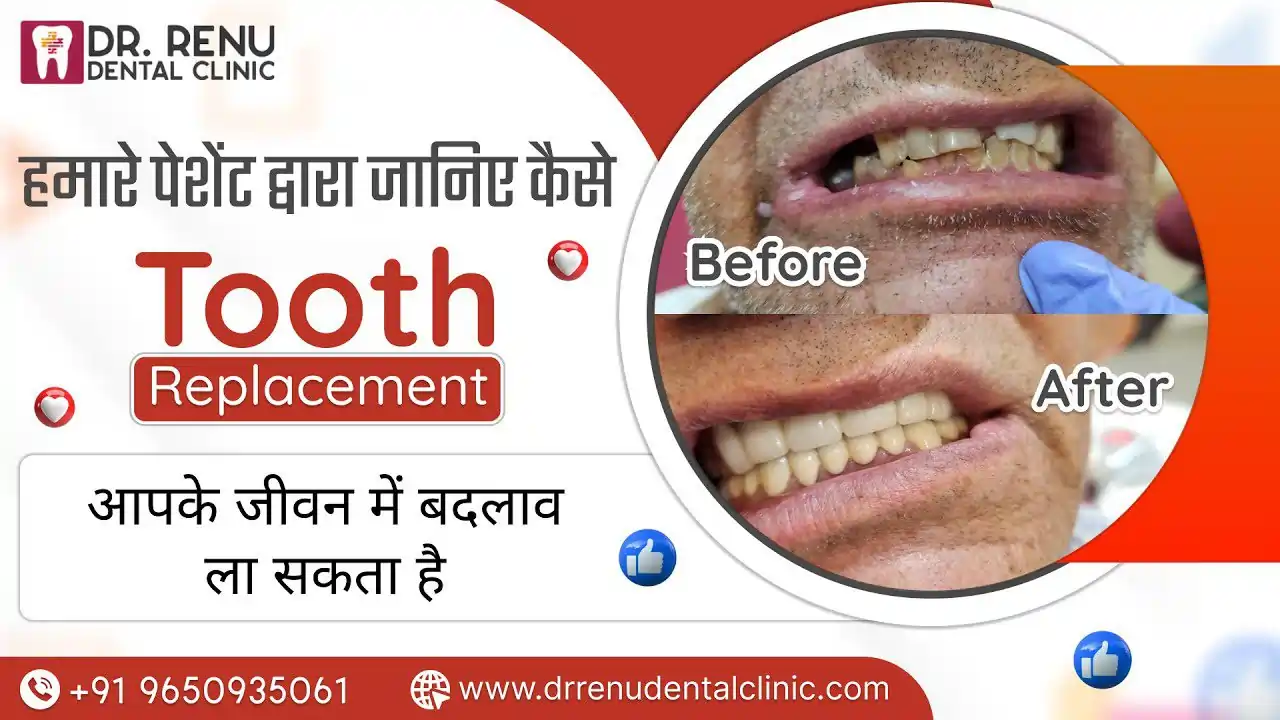
 Facebook
Facebook
 Instagram
Instagram